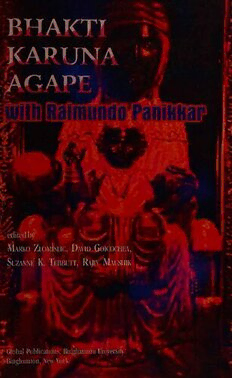
Bhakti Karuna Agape with Raimundo Panikkar PDF
Preview Bhakti Karuna Agape with Raimundo Panikkar
BHAKTI i = T >+ ~ } id edited by ~~ ॥| |. /1 011 (1,1 1/86 11 /॥0 11१ SuzANNE K. Tepsurt, (पाए SES d E ec, Ex "mi 1 » * Global Publications, Birighamton University »Binghamton, New York BHAKTI KARUNA AGAPE WITH RAIMUNDO PANIKKAR edited by Marko ZLOMISLIC, DAVID GOICOCHEA, SUZANNE K. TEBBUTT, Rajiv MAUSHIK Global Publications, Binghamton University Binghamton New York 2002 Copyright © 2002 by Global Publications All rights reserved. No portion of this publication may be duplicated in any way without the expressed written consent of the publisher, except in the form of brief excerpts or quotations for review purposes. Publication Data: Title. Bhakti Karuna Agape with Raimundo Panikkar Editors: Marko Zlomislic, David Goicochea, Suzanne K. Tebbutt, Rajiv Maushik ISBN: 1-58684-235-8 Date: June 10, 2002. Distributed by: Global Publications, Binghamton University State University of New York at Binghamton LNG 99, Binghamton University Binghamton, New York, USA 13902-6000 Phone: (607) 777-4495 or 777-6104; Fax: (607) 777-6132 Email: pmorewedQ binghamton.edu http://ssips.binghamton.edu CONTENTS Introduction: Bhakti-Karuna-Agape David Goicoechea ............cccceccecasceceececcscuccecescuceecacenceseaveceveasens 1 Bhakti-Karuna-Agape: An Inter-Cultural Challenge Raimundo Panikkar अ 31 Bhakti—The Twine in the Spectrum Debabrata Sinha ................ sss nes 45 A Scheme For Receiving Bhakti And Agape:—Two Forms of Love— Into Thought John 6. (त्राय... 61 Song of the Lord: Aria or Duet? Richard S. 0, Brown ,, ११११ 75 Love And Knowledge in The Bhagavad Gita Martin ANIC ............ccccsccsccucceccscuscaucesenscescatcencensenscauseeseaeues 03 The Passion of Arjuna Charles Elliott Vernoff ............cc.cccccsccecccsccucceuccusccuccusceuscarseuscs 105 The Nature Of Buddhist Compassion: Karuna Kenneth K. 11202... 127 Karuna and the Theandric Experience: A Hermeneutic of the Transi- tion from Theravada to Mahayana John R.A. Mayer .........νννννννννενεννννννννννννυνν εεν νενν νν ενν νεν ννννννννννννννον 137 The Mahayana Buddhist Pantheon: A Phenomenology of Divine Love Richard A. एदा... 147 Compassion at The Crossroads: Schopenhauer on The Basis of Morality Timothy J. १1010411... 173 Art, Religion and the Shift of Consciousness: An Issue of Satisfaction Stephen 091... 187 The Spirit and the Bride Say "Come:" Continuing a Hindu-Christian Dialogue Katherine K. Young ........Ψ.Ἅννννννννννννννννενννννννννννννεννννννννμννννεννννννον 205 Love Stronger than Death and Panikkar's "And": (Jesus - Arjuna - Thich Nhat Hanh) David Goicoechea .....................seeeeeH 227 Agape and Spontaneity: An Exploration of Panikkar's Approach Young-chan Ro १५ 245 Panikkar's Three Worlds: A Personal Introduction Scott ΜΝ 257 INTRODUCTION BHAKTI- KARUNA - ÁGAPE David Goicoechea Mutual Fecundation Raimundo did it! He talked about love in such a lovely and loving way that we each loved it and we each loved him and we each loved each other more because of him. Raimundo did it! He talked about bhakti with such play and devotion that we each delighted in the duty of its pure being — its pure consciousness — its pure bliss. He talked about karuna with such wit and compassion that we were each taken into the calm seren- ity of its embodied enlightenment — its embodied teaching — its embodied community. He talked about agape with such irony and self- deprecation that we each were called to responsibility in the creativity of its joy — of its sorrow — of its glory. He obviously lived in the world of the good Samaritan— suffering servant with the wisdom and 1 2 INTRODUCTION duty of Krishna—Arjuna and the enlightened sympathy of the Arhat- Bodhisatva. But how did he do it? How did he captivate us? How did he so impress us that now, five years later, we are still clearly and strangely touched by him? How did he so embody and communicate the ideal that we would each like to be like him? Raimundo did it and was able to do it because he is a scientist-philosopher-theologian who has re- sponded to the intercultural challenge with the artistry of muse-duende- angel to such a degree that he has the stature-authority-appeal of a hero-saint-genius. His mother’s Catalonian-Toulousian culture let there be culti- vated in him not only the Benedictine-Dominican-Jesuit stock first planted by James the Apostle and nourished at Montserrat, but also the roots-offshoots-fruits of courtly love and literature which first flour- ished around Eleanor of Aquitaine, and stretched out into the soil of that ancient Greek—Roman—Spanish lore that formed his language- speech-tongue. His mother's Catalonian culture received mucho fecun- dation (when he first said the word we were not sure whether he said “mucho” or “mutual’’) from the Seville of Isadore and of the Andalusian- Flamenco, from the Granada of the Sacra Monte and the Alhambra, from the Madrid of Velasquez, Goya and the bulls, from the Toledo of El Greco, from the Avila of Teresa and her John of the Cross, from the primeval Basques who painted on cave walls and danced on coffins. But his city of Barcelona is not just any city from Cadiz or Cordoba to Guernica and San Sebastian. It is in fecundation with them. And Tavertet is not Barcelona. It is the primitive mountain retreat from which our world-winging falcon looks down in contemplative creativity upon his motherland and upon his world. His father’s love let there be distilled in him a love for the nature and culture of India. He loved with his father’s love the sounds, the smells, the tastes, the sights and the feel of India. From infancy he smelled and ate his father’s cooking. He heard and longed for his
